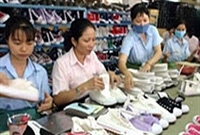
| EuroCham opposes EU’s plan on Vietnam’s shoes | |
The European Union’s plan to impose anti-dumping duties on Vietnamese leather-capped shoes will have an adverse effect on the Vietnamese economy as it still faces a lot of difficulties after the global economic crisis. The President of the European Chamber of Commerce (EuroCham) in Vietnam Alain Cany, stated this at a press briefing in Ho Chi Minh City on December 15. What the EU Council of Ministers and governments plan to do is wrong, he said, adding that EuroCham, a large community of European businesses in Vietnam, opposes the decision. The European Commission’s (EC) end of year review was made public on October 13, and said that Vietnamese leather-capped shoes are continually dumped on the EU market and proposed an extending the taxes for another 15 months (from January 2010 to March 2011). Senior officials from all 27 EU countries will meet on December 17-22 to make a final decision on the issue. Mr Cany said that the European business community in Vietnam will work closely with the Vietnamese government to find evidence proving the transparency and self-reliance of Vietnamese footwear enterprises. Several EU members have not agreed with the EC’s figures in this case, said Cany, adding that the calculations should be replaced with solutions suitable to the situation in Vietnam but must abide by the General System of Preferences (GSP) regulations and minimise any possible damage to Vietnamese footwear producers and their workers. According to EuroCham President, the EU should continue supporting Vietnam as it has done before through sound investment decisions and respecting the trade commitments between the two parties. The EC’s imposition of a 10 percent anti-dumping tax on Vietnamese leather-capped shoes over the past three years and its recent decision to remove the country’s footwear sector from the GSP list during the 2009-2011 period have caused a lot of damage to Vietnamese footwear maker who employ more than 650,000 workers. Many politicians and business communities from not only Vietnam have protested at the EU’s unreasonable proposal. They say that the move does not conform to EU policy, does not liberalise trade and is a return to protectionism. | |
| VOV |
